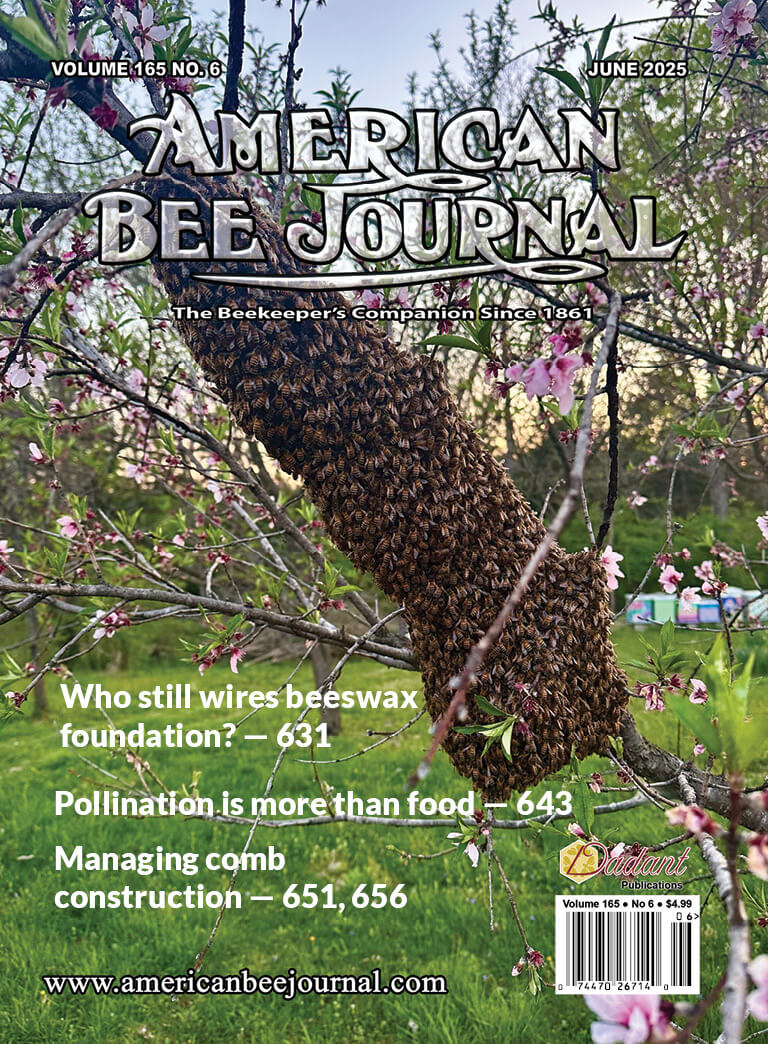First Year Beekeepers
Hello:
My husband and I are first year beekeepers. We live in the Washington, DC area and have a weekend place in West Virginia. We set up two beehives in the spring of 2017 at our place in WV. There’s a small stream nearby and more wildflowers all spring, summer and fall than you can imagine. I’m including a photo from the end of September of one of our bees busily harvesting pollen from daisy fleabane.

Learning about the incredibly complex world of honey bees has been very interesting and rewarding. We’re now focused on getting them through the winter. We attended a honey bee lecture in Minnesota put on by the University of Minnesota “Bee Squad” who said that bees don’t freeze during the winter – if they die it’s because they ran out of food. For someone from Minnesota to say that bees don’t freeze was a huge relief to me. I’m from Minnesota originally, and I know first hand how harsh and long the winter is there. So our bees should be just fine (temperature wise) in West Virginia!
Thank you,
Roxanne Rothschild
Artificial Intelligence for Honey Bee Hives
We wanted to share with your readers that we are currently running a Kickstarter online fundraising campaign to raise funds for our electronic beehive monitoring project.
We all know the threats facing bees and beekeepers today. It was the 2013 Time magazine cover “A World Without Bees” and the accompanying article that first stirred me to consider how I as a computer scientist and a beekeeper could help improve the health of bee colonies.
Our electronic beehive monitor, called BeePi, is based on the hypothesis that in the future significant practical and scientific benefits will come from transforming our bee yards into smart worlds. Think of a beehive as an immobile robot that monitors the health of the bee colony inside, analyzes the data from its sensors, and alerts the beekeeper of any deviations from the norm through the Internet of Things.
To make this vision of beehives as intelligent immobile robots a reality, we need terabytes of good quality data collected over multiple years and at multiple locations. We need this data to develop automated diagnostic bee health models. In other words, the BeePi system is all about putting artificial intelligence (AI) into beekeeping.
BeePi is a multi-sensor electronic beehive monitor all of whose components fit in a standard Langstroth shallow or medium super. While there are other electronic beehive monitors available today, BeePi is unique, because it uses computer vision and video analysis to estimate forager bee traffic levels. Another unique feature is sensor fusion, because the system combines information extracted from video, audio, and temperature signals to make estimates of the beehive’s health. All BeePi hardware components are completely off-the-shelf.
We assembled and tested the first pilot version in September 2014. In 2015, we tested two units for two weeks. Then in 2016, we tested a total of four units (two each at two different bee yards) for approximately two months. This year we have been running four units in four beehives (two each at two different yards) since early May and have collected 125GB of video, audio, and temperature data.
We are continuing our fundraising campaign until it officially ends November 14, 2017. Since we have raised enough money to assemble several more monitors to deploy in the next beekeeping season, thanks to the generous support of our Kickstarter backers, we would like to raise funds to support Utah State University student research assistants on this project.
Student research assistants are vital to the success of this project. They help to design, assemble, test, and repair the monitors. They assist with data collection and analysis, develop software algorithms and hardware designs, and co-author reports, conference papers, and journal articles.
It is important to note that this project benefits the wider beekeeping community. Students, who otherwise would not be aware of beekeeping, are introduced to the challenges faced by the beekeeping industry. Beekeeping receives wider exposure through the project’s open source hardware and software and scientific publications. For example, our first scientific conference paper on BeePi won a best paper award at the 2016 IAENG International Conference on Computer Science in Hong Kong.
Thank you for taking the time to consider our BeePi project’s fundraising campaign. The project’s Kickstarter URL below provides more information about the project, including videos, photos, hardware diagrams, software repositories, and project updates.
We look forward to receiving feedback and suggestions from beekeepers everywhere. All donations are greatly appreciated. Donors of $40 or more can receive a reward – a project t-shirt (see photos on the Kickstarter URL below) – by mail (U.S. mailing addresses only).
The project’s URL is: https://www.kickstarter.com/projects/970162847/beepi-a-multisensor-electronic-beehive-monitor. You can also go to www.google.com and type “vladimir kulyukin kickstarter” to find the project’s URL.
Sincerely,
Vladimir Kulyukin
honey bee on New England Asters
Here is a cool pic that I took this week of one of my girls on my New England Asters. I like it because of her visible full pollen pouch and a bit of wing tattering. I was able to …


